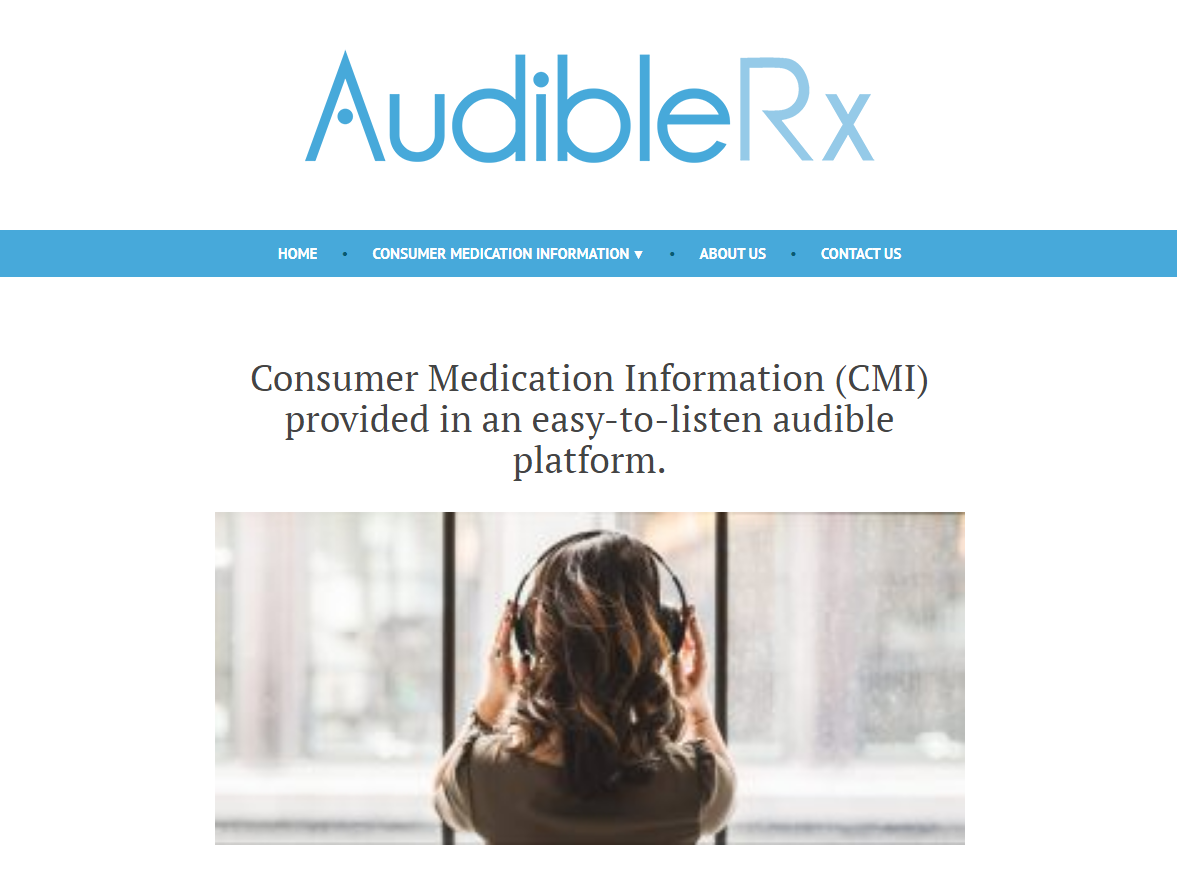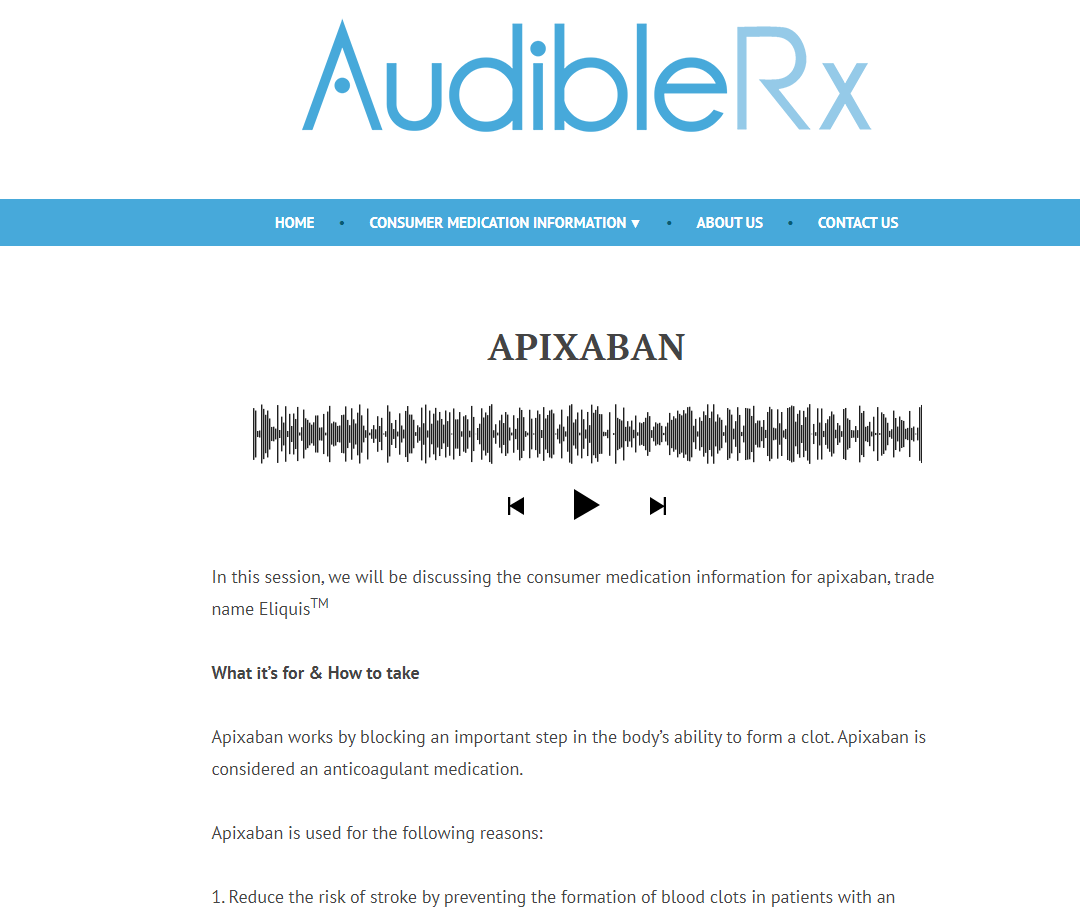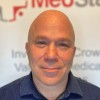AudibleRx: Consumer Medication Information (CMI)
by Steve Leuck
Consistant, accessible and useful consumer medication information provided in an easy-to-listen audible platform.
Santa Cruz, CA United States Patient Education Patient Power Tools! 2021 Vision challengeAbout our project

The problem we solve: In the United States, 36% of adults lack the required health literacy to read or act on prescription labels, patient handouts, understand pharmacist counseling, or to convey their needs to the pharmacist. Low health literacy is associated with poorer health outcomes and higher hospitalization rates, as well as an increased risk of adverse medication events. Whether at the tele-health visit, hospital bedside, or pharmacy counter, patients are regularly counseled about multiple prescriptions in less than two minutes. The patient is then sent home with stacks of medication leaflets that may be difficult to read and understand.

About our solution: AudibleRx is not meant to replace pharmacist counseling. It is an accessible and useful enhancement to the current Consumer Medication Information (CMI) options. Content designed to meet specific health literacy guidelines. The purpose is to create Consumer Medication Information that is more useable to the reader/listener, while also meeting all of the requirements listed in the FDA Useful Consumer Medication Information guidance document. We want this CMI to be accessible as well as useful to a much larger percent of the population than current CMI options. The format designed to allow consumers to read-along with the audible presentation of the CMI. When accessed on their mobile device or computer, the consumer will LISTEN to a voice narrate the CMI of the specific medication. The consumer will then have the option to scroll the screen and read along with the narration. Below is a screenshot of our platform and what the consumer will see.

Progress to date:
- We have recently launched an updated web platform that is simple, accessible and consistent.
- We currently have 18+ mid-level practitioners who have signed up to use our product with their patients; however, our product is not limited to those who sign up. AudibleRx is available to everyone.
- Over the last 6 months, we have increased our month over month original user average by 1,500+.
- We have evolved our business strategy in the past 6 months to provide AudibleRx, at no cost, to both health care providers and consumers.
About Our Team

Creator: Steve Leuck
Location: California
Bio: Empathetic educator, dedicated to integrity, honest communicator, willing learner and project finisher. I have over 33 years' experience in pharmacy; including institutional, community, medical clinic, MTM, project implementation, regulatory compliance and management. In 2011 I began studying our nation's current state of Consumer Medication Information and Health literacy. I chose to make a difference. I founded AudibleRx with the intent of finding a more accessible and useful way of educating individuals at home about their medications. As a health care provider I like to talk with my patients I will continue to talk with my patients. My concern is what resources our patients use for follow-up medication education after their tele-health, pharmacy, clinic or hospital visit. AudibleRx.com provides consistent, accessible and useful education in an easy-to-listen format designed so everyone can understand.
Title: CEO/Founder
Advanced Degree(s): Pharm.D.
About Team Members
Luka Tehovnik
Project Manager, Pharm.M.
Biography: I received my Masters degree in Pharmacy from the Faculty of Pharmacy, University of Ljubljana, Slovenia. In 2012, I connected with Steve through one of my blogs and immediately identified with his idea. I was fortunate to complete a clinical pharmacy rotation in the US as part of my studies; this gave me an insight in the US healthcare system. By observing the discharge process and understanding the situation in depth, I've made it my mission to help improve the process to ensure patients are equipped with medication information. Patients should be able to achieve the best treatment outcome, any time, anywhere.
Apart from being involved with AudibleRx, I also work in a pharmaceutical industry as a Safety & Medical Information Manager, gaining relevant experience in pharmacovigilance, medical information, and medical field in general.
Title: Project Manager
Advanced Degree(s): Pharm.M.
LinkedIn:
https://www.linkedin.com/in/lukatehovnik
Jill Adachi
COO, MS.Pharm.
Biography: I have 35+ years in health care management in institutional and industry settings with a proven track record in successful start-ups, turnaround operations, and IPOs. In 1996, I also successfully started Strategic Healthcare Staffing, Inc. providing temporary staffing for pharmacists and pharmacy management consultation. The company employed up to 50 employees until the dissolution of the corporation in 2016.
Title: COO
Advanced Degree(s): MS.Pharm.
LinkedIn:
https://www.linkedin.com/in/jilladachi
About Our Company

AudibleRx, Inc.
Location: 961 Brommer St
Santa Cruz, CA 95062
US
Founded: 2016
Website: https://www.audiblerx.com/
Product Stage: In the Market
YTD Sales: Working on it
Employees: 3-5
How We Help Patients
We know that consumers who understand their medications are more likely to take them and as a result, have better health outcomes, greater patient satisfaction, and fewer re-hospitalizations. We also know that many consumers are challenged with literacy or visual difficulties and cannot read or understand their prescription bottles let alone the attached FDA required consumer medication information. Regularly, patients are counseled about multiple medications at the pharmacy counter or at the hospital bedside in a short duration of time. Physicians, pharmacists, and nurses are incredibly busy and are commonly monitored for job productivity through some sort of productivity metric. Patients are then sent home with stacks of paper to read for follow up medication education. AudibleRx was started to solve this problem. We want every consumer to understand their medication, take it as prescribed, and lead healthier lives. As a result, health care costs are saved, people are healthier and communities are stronger.
How We Help Physicians
How do physicians and other health care providers educate their patients about the new medications they are prescribing for them? Quite often they will speak with the patient before they leave, or have their staff educate the patient on the new medications. Alternatively, they may assume the pharmacy will educate the patient when they pick up their new prescription. When a health care provider offers AudibleRx to their patients, they can ensure that the patient will receive access to consistent, simple-to-use, and useful information about their medication every time. Patients will listen to a session and then have a clear idea of what they do and don't know about their medications and be in a much better position to take educated questions back to their health care provider. Our platform is a wellness benefit designed to enhance the knowledge and awareness a patient has about their medications.
How We Help Hospitals
Providing AudibleRx as an inpatient and take home medication education tool is an incredibly cost effective way of addressing hospital performance. This includes decreasing readmission rates and bettering overall performance scores.
Hospital performance is measured by CMS through the assessment of data provided on:
- Thirty Day Readmissions: Every year there are 35 million hospital admissions, costing $350 billion. Approximately 7 million are readmitted within 30 days. Studies show 26% of all readmissions are due to patients not taking their medications correctly, costing a total of $20 billion/year. The best way to minimize as many of these losses as possible is to have a strategy in place to educate patients on the importance of taking their medications appropriately. Decreasing readmissions even 1% can mean a savings of millions of dollars for a large hospital system.
- Hospital Consumer Assessment of Hospital Provider and Systems (HCAHPS) survey as measured by the Centers for Medicare and Medicaid (CMS) rewards and reimburses hospitals based on their performance scores. The financial incentive around the survey intends to improve the overall standard of care in the nation. The reimbursement for 2017 puts 2% of a facility’s compensation at risk depending on the survey scores. AudibleRx specifically addresses questions on the survey regarding the education of patients about their medications. Taking the time to educate a patient on the purpose and potential problems from each medication can mean higher patient satisfaction at discharge time, as well as improved medication outcomes.
How We Help Partners
Partners with AudibleRx may include the following:
-
Any health care provider looking to provide awesome consumer medication information to their patients.
-
Any employer who would like to provide a useful wellness benefit for their employees.
-
Any curator of medical information who would like to add a useful and accessible consumer medication information platform to their library.
-
Promote and support health-care non-profit organizations that promote patient, consumer information on disease state and related medications.
AudibleRx helps our partners by helping the clients they serve. Increased medication awareness leads to improved medication adherence, positive patient outcomes, and a stronger community.
Innovation Details
Intellectual Property Summary
- Each medication education session is written, recorded and copyright protected by AudibleRx.
- AudibleRx is a registered trademark http://tmsearch.uspto.gov/bin/showfield?f=doc&state=4801:ontt46.2.1
Clinical Information
Disrupting Medication Education with Increased Health Literacy
Picture this:
Your 53 year old brother, Steve, has been recently admitted to the hospital with acute chest pain. He is discharged five days later after undergoing cardiac angioplasty, which led to the placement of a stent in order to increase blood flow to his heart and treat his newly diagnosed acute coronary syndrome.
Steve, a skilled laborer, has never been sick a day in his life. Now, he is sent home from the hospital with 50 sheets of paper and told to stop by the pharmacy, on his way, to pick up five new medications. His doctor warned him that if he doesn’t take his medications he could die.
Tired from his stay in the hospital, Steve walks into the pharmacy to pick up his medications. After a 30 minute wait, Steve signs his name at the register and meets the pharmacist at the counseling area. The pharmacist, pressured with time and productivity metrics, discusses the most important points of all five medications in under two minutes.
Steve is now sent home with a combination of three blood pressure medications, a blood thinner and a cholesterol medication, all to treat his newly diagnosed coronary syndrome. He feels like his life has just been turned upside down. In his prescription bag he has more paperwork, Consumer Medication Information leaflets, which the pharmacist said he could read over if he had any questions about his medication.
Here’s the deal, Steve has never been much of a reader. He is smart and a quick learner; however, he is more of a “hands-on” type of guy. Will Steve take his meds appropriately, or will he let them slide because he is feeling better now that he is at home? Does he understand why he is taking these specific medications, and importantly, does he understand the consequences of not following through on his therapy?
Health Literacy:
The degree to which individuals have the capacity to obtain, process, and understand basic health information and services needed to make appropriate health decisions.(1)
- In the United States, 36% of adults (115 million) lack the required health literacy to read or act on prescription labels, patient handouts, or to understand a pharmacist counseling recomendations.(2)
- Low health literacy is associated with poorer health outcomes, higher mortality rates and increased risk of medication errors.(3)
Problems with current Medication Education:(4)
- On average, individuals with low health literacy can read at a fifth-grade level, while Consumer Medication Information is written at a tenth grade level.
- Pharmacy flyers are different from one store to the next depending upon the vendor.
- Pharmacists are under tremendous pressure to meet pharmacy metrics and regularly counsel patients on 3 or 4 medications in less than 2 minutes.
- Health professionals overestimate patients’ level of understanding.
- Mail-order pharmacies send out prescriptions as if they are just a packaged commodity as opposed to treating medication as a prescribed course of treatment.
- Hospitals focus on meeting the regulatory and licensing requirements of the facility when they send a patient home with a three inch stack of papers.
Current Limited Solutions:(5)
- As of now, there is no widely accepted strategy that pharmacists have to help patients with low health literacy understand their medications.
- Current strategies used to help support low health literacy patients include ways to help the patient be structurally adherent, rather than understating their medications. They are as follows:
- Medication synchronization
- Pill boxes
- Blister packaging
- Refill reminders
Cost of Low Health Literacy:
- “Low Health Literacy; Implications for national Health Policy”:(6)
- This study reviewed findings from the 2003 U.S. Dept. of Education Adult Literacy survey. (NAAL National Assessment of Adult Literacy).
- Based on the findings that 36% of the adult U.S. population has basic or below basic health literacy levels:
- The estimated cost to the United States health care economy for low health literacy is $106-$238 billion annually.
- This total cost represents between 7-17% of all U.S. healthcare expenditures.
- On average, an inpatient hospital stay for a patient with low health literacy costs $993 more than other patients.
- According to a recent Veterans Health Administration study, (in northern Florida and southern Georgia):(7)
- Meeting the needs of those with marginal and inadequate health literacy could produce economic savings of approximately 8% of total hospital costs for this population. This is a savings of $2480 per patient.
Solution:
- Deliver Consumer Medication Information to the consumer through accessible patient portals, in order to bridge the medication-education-gap that exists between patients and their health care providers. Eliminate any cost barriers by making it cost-free and available on any internet enabled device.
- Accessible education, with the intent of helping patients and their caregivers understand what they do and don’t know about their medication so they may take educated questions back to their own health care provider.
- Design CMI content with specific Federal Health Literacy guidelines (8,9) in mind. Create a document that is more pleasing to the reader and easy to read, while also meeting all of the necessary requirements listed in the FDA Useful Consumer Medication Information guidance document.(10) This document needs to be "accessible" to a much larger percent of the population than current consumer medication information (CMI).
- Format CMI content to allow consumers to read along with an audible presentation of the CMI. When accessed on their mobile device or computer, the consumer will LISTEN to a voice narrate the CMI of the specific medication. The consumer will then have the option to scroll the screen and "read along" with the narration.
AudibleRx, Consumer Medication Information you LISTEN to.(11)
References:
- Quick Guide to Health Literacy: http://health.gov/communication/literacy/quickguide/factsbasic.htm
- National Network of Libraries of Medicine; Health Literacy: https://nnlm.gov/outreach/consumer/hlthlit.html
- Low Health Literacy; Implications for National Health Policy: http://publichealth.gwu.edu/departments/healthpolicy/CHPR/downloads/LowHealthLiteracyReport10_4_07.pdf
- Health Literacy; The Gap Between Physicians and Patients: http://www.ncbi.nlm.nih.gov/pubmed/16100861
- Center for Medicare and Medicaid Services: https://www.cms.gov/Medicare/Provider-Enrollment-and-Certification/SurveyCertificationGenInfo/Downloads/Survey-and-Cert-Letter-13-32.pdf
- Low Health Literacy; Implications for National Health Policy: http://hsrc.himmelfarb.gwu.edu/cgi/viewcontent.cgi?article=1173&context=sphhs_policy_facpubs
- Association between health literacy and medical care costs in an integrated healthcare system: a regional population based study:
http://bmchealthservres.biomedcentral.com/articles/10.1186/s12913-015-0887-z
- Simply Put: a guide for creating easy-to-understand materials: https://www.cdc.gov/healthliteracy/pdf/Simply_Put.pdf
- National Institutes of Health; Clear Communication: https://www.nih.gov/institutes-nih/nih-office-director/office-communications-public-liaison/clear-communication
- FDA Guidance Document; Useful Consumer Medication Information: http://www.fda.gov/downloads/drugs/guidancecomplianceregulatoryinformation/guidances/ucm080602.pdf
- AudibleRx http://audiblerx.com/
Regulatory Status
AudibleRx does not diagnose, cure or treat any disease and therefore AudibleRx does not require FDA approval.
Consumer Medication Information is developed by commercial vendors. FDA provides a Guidance Document with recommendations on how to write Useful CMI; however, the FDA does not approve or disapprove CMI.
How we will use the funds raised
Our mission is simple and straightforward; provide useful and accessible consumer medication to everyone at no cost to either the provider or consumer. In order to do this, we have two major hurdles.
- We need to market our product.
- We need to build more language options for our library (currently available in English and Spanish).
Any funding we receive will be used to build marketing materials as well as develop new medication sessions for the AudibleRx library and make them available in new languages as appropriate.
Thank You
Medication education is a national crisis. Our concern is what resources patients use for follow-up medication education after their tele-health, pharmacy, clinic, or hospital visit. AudibleRx provides consistent, accessible, and useful education in an easy-to-listen to format, designed so everyone can understand.
As a HCP I talk with my patients and will continue talking to them. Many pharmacists and nurses, driven by productivity metrics, need to limit the time they spend with their patients. Following an abbreviated counseling session, patients are often sent home from the hospital or pharmacy with stacks of paper to read for follow-up education.
Please help us to reinforce improved health literacy by supporting our project.
Updates
No updates found .
Supporters
-
 , MD, MSc
, MD, MSc
12/08/2020 - Liked the project.
10/21/2020 - Liked the project.
10/19/2020 - Interested in a partnership with the project.
10/19/2020 - Liked the project.
10/19/2020 - Followed the project.
10/18/2020 - Liked the project.
10/18/2020 - Followed the project.
10/18/2020 - Liked the project.
10/18/2020 - Followed the project.
10/18/2020 - Liked the project.
10/18/2020 - Followed the project.
10/18/2020 - Liked the project.
10/18/2020 - Liked the project.
10/17/2020 - Liked the project.
10/17/2020 - Followed the project.
10/16/2020 - Liked the project.
10/15/2020 - for the Translation Help
10/15/2020 - Liked the project. , MS
, MS
10/15/2020 - Liked the project.
10/15/2020 - Followed the project.
10/15/2020 - Liked the project. Instant Feedback
Instant Feedback
Help us find best new ideas to fund by telling us what you think. Your feedback goes straight to the team behind this project in private, so tell them what you really think.
47Medstartr
Index Score22
Interest
Score5
Adoption
Score16
Likes1
Partners0
Pilots6
Follows-
This campaign has ended but you can still get involved.See options below.
$25 pledged of $25,000 goal
Instant Feedback
Help us find best new ideas to fund by telling us what you think. Your feedback goes straight to the team behind this project in private, so tell them what you really think.




